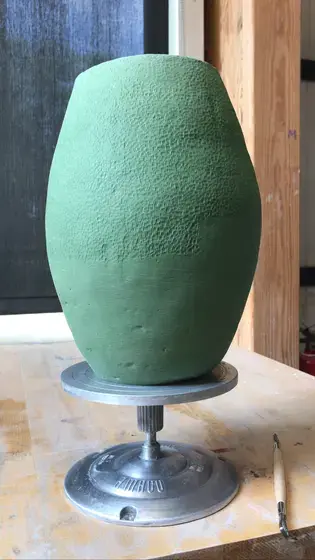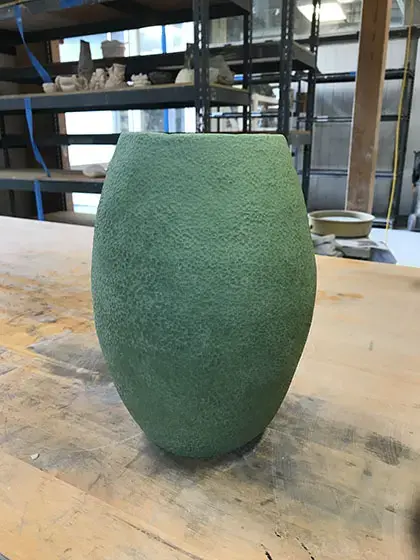Material Boy
Reinterpreting Waste with Sawyer London '24
By Mary Brothers '22
Growing up, Sawyer London ‘24 was always told to “just wait until college.”
“I've always been driven and known exactly what I want to study. And it was so hard in high school and middle school to take all these Gen. Ed. classes that I didn’t care about,” said London.
In a lot of ways, Bennington seems to have sought out London. He first heard of the college when his mom showed him an admissions video of one of the house tours.
“The student [in the video] is showing the plants that she rescued from the dumpster and the mushroom she was growing,” said London. “My mom showed me that and was like, ‘That's you. You are that person to rescue a plant from the dumpster and have all your jars and things.’”
After visiting a college fair in Washington, DC, London visited the Bennington table, where he met an admissions counselor.
“She looked at me and said, ‘You seem like someone who should visit— I think you would get a lot out of it.’ So I did,” said London.
When London first got to Bennington, he was more than ready to finally start pursuing his interests, and he has not looked back since.
“I've transitioned my studies more to a ceramic sculpture textiles focus, still with wearables in mind," said London. “And I’ve always had sustainability, environmental justice, and social justice at the core of the work and in all the materials and the processes,” said London.
London recently finished the first draft of his Plan essay, entitled: “Waste as Motivation and Material: Exploration Through Art and Social Action.”
“I’m really excited for my first Plan meeting,” said London “I met with a peer writing tutor, and she told me, ‘They're pretty much going to pull it apart and ask you about every sentence,’ and I'm really excited to fight for what I want to be included and to also realize what I don’t need in it,” said London.
Last year’s Beyond Plastics Pollution course with Judith Enck was particularly formative for London’s process of work at Bennington.
“Through that class, I learned the value in writing a letter to your senator as an assignment,” said London. “You're going to do research, and you're going to produce this letter, which is writing practice. Then you're going to mail it to your senator—and who knows, maybe they're not going to read it, but there's the chance they will.”
After getting an article on reducing single-use plastics published in a local magazine, London was inspired to keep making “purpose-driven artwork.”
When you make something happen, it's so much more satisfying.
Sawyer London '24
“Now my work is exploring that combination of, ‘How do I use waste as material and reinterpret those materials? How do I change preconceptions and show people why they produce this waste and how we can use it in a wearable, artistic, functional, and circular way?’" said London.
One of London’s favorite pieces of work from his time at Bennington so far was a large ceramic piece he constructed in the studio, a 20 inch “giant coil.” London found the creation of the piece to be a practice in itself.
“I basically painted it all in green slip, and then I sat there and did thousands of little indentation marks with this tool that created a really cool surface design,'' said London. “That was a great piece because I wanted to work at a large scale that I hadn't really done before, and I wanted to commit to a really conceptual process.”


Last year, London deferred his first Field Work Term to the summer, completing online courses about urban sustainability while working as a server at a local restaurant.
“[The courses] were really hard to engage with,” said London. “It was all asynchronous lectures and videos that you just sat in front of and answered a couple questions, along with a writing assignment, and that was it. But at the same time, I was working at a restaurant that I'd worked at before COVID, and that was amazing. I'm an extroverted person, so I love serving.”
Going forward, London hopes to explore more of the sustainability and fashion world.
“What was nice about my last experience was that I learned what I didn't want to do. This year, I'm thinking about applying to the Endeavor Environmental Foundation Fellowship,” said London. “I’m also looking at different companies doing cool things with sustainability and waste. I would love to work in an arts-focused fashion space.”
London’s after-college dreams largely pertain to the worlds of sustainability and fashion—and, naturally, Fashion Week in Paris.
“I picked up French this term. I’d taken it in high school, and the reason I’d chosen it was because I wanted to go to Fashion Week—and they speak French in Paris,” said London.“The reason may sound silly, but it does connect to my studies, especially knowing how many cultural arts and fashion centers are in Francophone countries.”
While London may have come into Bennington with a clear path of studies in mind, he still “cannot imagine” having to choose one major.
“I like the idea that all of the classes I’m taking support each other. For me, that’s creating purpose-driven artwork,” said London.
Last year, London participated in the President’s Working Group on antiracism, further work on which is now being led by Dr. Alfredo Medina, the College’s new Vice President for Diversity, Equity, and Inclusion and Chief Diversity Officer.
“”Last term, the group was trying to figure out how we can set out goals on an antiracist framework for the College,” said London.. “The biggest thing that I want to push going forward is getting every level of this institution grounded and focused on developing an antiracist framework.”
London sees Bennington’s size as an asset to work in activism.
“You’re a big fish in a small pond. You can make a much bigger change at a smaller institution where you know more people,” said London.
When reflecting on the lessons he has learned at Bennington so far, London can’t help but emphasize how the College has been a catalyst for his self-growth.
“Being here, I realized you really have to be a self advocate—not just in terms of your Plan and the classes you want to take, but also if you want to get anything done, or if you want to make friends with someone, or want to develop anything,” said London. “I think it's a good lesson for life, and it’s something we intuitively learn here. When you make something happen, it's so much more satisfying.”